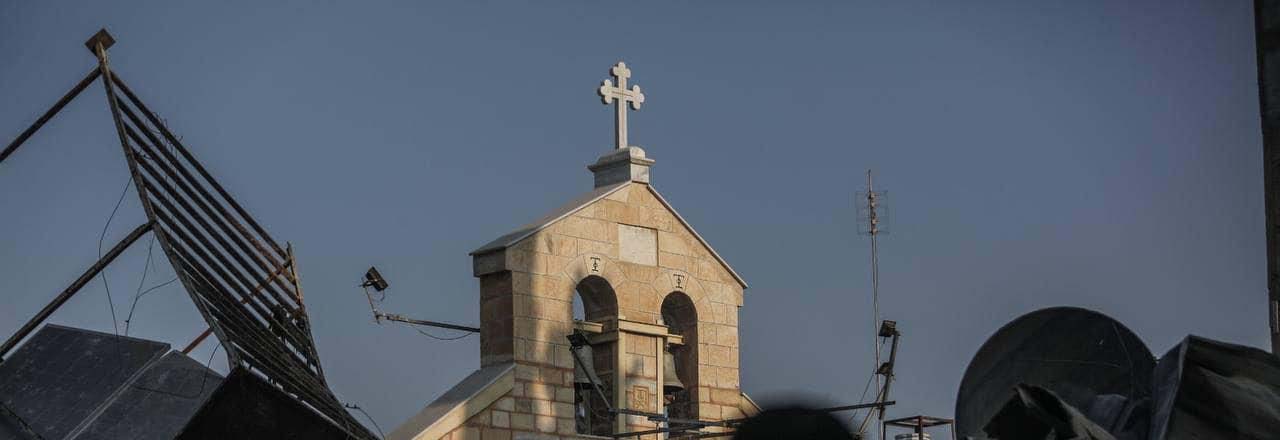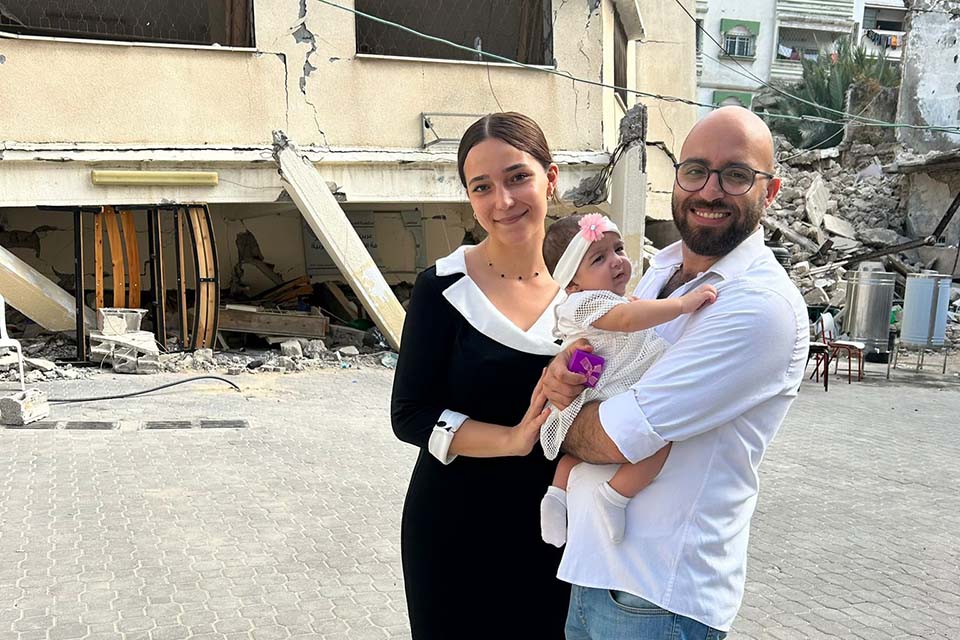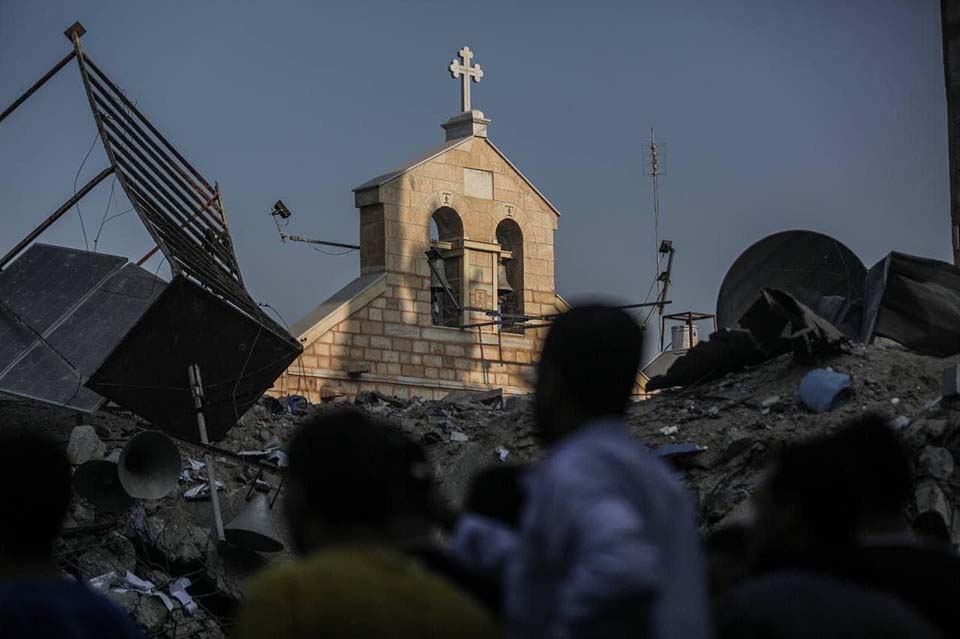

Snapshot of Life in Gaza
The crisis in the Holy Land has unfolded into a humanitarian catastrophe, causing widespread suffering among innocent civilians. Here, we share messages from Catholic Relief Services staff members in Gaza, the majority of whom are displaced from their homes and have lost loved ones. Despite this, they continue to work tirelessly to help families in need. From the beginning of this crisis, they have provided cash assistance to hundreds of thousands of people, as well as support to church shelters providing refuge in their compounds. Operations are expanding to provide critical relief supplies as access of shipments into Gaza allows. In this rotating series, we hear perspectives from CRS Gaza colleagues about their evolving daily life and conditions.

Damage to buildings in Gaza during the Israel-Hamas war.
Photo courtesy of Caritas Jerusalem
Mahmoud
CRS field officer
Hosting more than 80 people in his home
“We are now hosting more than 80 people in my home. They are extended family and neighbors from the community. My family and I have three apartments in our home, across two floors—my apartment, my brother’s apartment and my parents’ apartment. Now, each of our rooms has eight to 10 people sleeping in them. Many are sleeping on the ground, with blankets or mattresses if we have enough. There is absolutely no personal space.
We keep getting messages that there will be an airstrike on the house next to us. So we have to be extra cautious. We have moved people out of the room that was on the side of that neighboring house, and now we are even more cramped than before.
There is no electricity here. We have no fridge, no drinking water. We have no fuel for the generators. We spent three days drinking unfiltered water. All of our time is focused on food—how we are going to get bread and water. We send out my nephews to stand in line. We actually need 10 young people to stay in line. It’s about seven to eight hours in line for bread, and four to five hours for water, which we carry back by hand.
When I go to the market, where stocks are running out, there are people sleeping outside all night, all day. Some people are sleeping in their cars.
The evening is horrifying. We are hearing many strikes—next to us, near to our house, far away from our house, in the area—and we don’t even know where it is. We just want it to stay daylight.”
Rami
CRS project officer
Sheltering in a church

Rami, his wife and infant daughter, pictured here, are sheltering with their extended family at the Church of St. Porphyrius in Gaza. Shortly after the church was damaged, leaving 18 people dead, Rami and his wife decided to have their daughter baptized.
Photo courtesy of Rami
Rami had spent much of his childhood on the grounds of the Greek Orthodox Church of St. Porphyrius, Gaza’s oldest active church. The congregation was always a welcoming place, especially for the small Christian population of the Gaza Strip. Now the spaces in the Church’s complex have become their temporary home.
“It is strange,” Rami says. “We are all now living in the church.”
Since violence erupted in the Holy Land in early October, the people of Gaza have been experiencing airstrikes. On October 9, Rami, his wife, their infant daughter, and their extended family fled their homes and came to the church, where about 300 families are staying in the complex’s few buildings.
“We are alive,” Rami says. “I don’t know if we can say that we are OK, but we are alive.”
On October 20, the Church of St. Porphyrius was hit by airstrikes. The strike hit a two-story building in the church compound, killing 18 people, including two children. Rami’s sister-in-law was injured and her husband killed. Rami tried unsuccessfully to resuscitate people pulled from the rubble, including an infant.
“I have lived through other conflicts before, but this is this is the first one in which I'm married and have a daughter,” Rami says. “It's totally different. I have this responsibility as a new father. Everything just comes to my mind, and I want to make sure that we are all safe."
Just days after the shelling, the priest approached Rami and his wife with a question.
“The priest came to us and asked what we thought about the idea of a collective baptism for the young children of nine Christian families staying at this and another church,” Rami says. “Of course, everyone was on board. Honestly, if something were to happen to us, he wanted the children to be baptized.”
Rami and his wife had originally been planning Kylie’s baptism for her first birthday.
“Still, it was perfect. It felt like a happy moment in this horrible time. We are a small Christian community here in Gaza, so we all know each other. We could share this moment together, separate from the war.”
As for the future, his plans are defined by a more immediate simplicity.
"More than wanting for food or hygiene or anything, we just want to end this war so we can continue with our lives, so we can organize ourselves and take care of our children in a safer place.”

Damage to the Church of St. Porphyrius in Gaza during the Israel-Hamas war.
Photo courtesy of Caritas Jerusalem
Dalia
CRS project officer
Sheltering with her family in a U.N. facility
“There is no safer place to go. If there was anywhere else to go, I would go there. I try and adapt. I know my situation is much better than others … people who couldn't leave their homes, or who are not with their families. I thank God for having this shelter and to be with my family. If we were apart, I would only be thinking about them, and wondering if they were harmed with every bombing I hear. I can't imagine what it is like for families who are separated from each other.

Two CRS staff members, Dalia, left, and Najilaa, right, in a U.N. training facility that has become a collective shelter for thousands of people.. The two young girls on the floor are each of their daughters. Photo by CRS staff
There are like a thousand people staying here. It’s like a big hall, with marks to separate each other. We have a small place, like two meters … like five or six family members for every two meters. There is so much noise at night, you can’t sleep.
I have two sons and one daughter. In the mornings, my son walks with the children to the lines for the bathroom, where they wait for at least an hour or more. I am waiting until midnight to use the bathroom. The biggest difficulty here is sanitation and hygiene, to keep my children clean and safe.
We are running out of food and water. My father, who is older, stands in line for five or six hours to get water for us. And what he can carry is not so much. I sometimes feel shame because I want to ask him to carry more, but it is too much for him. We are getting sick. I am coughing all of the time and many of the people near me have the same symptoms.
If we have electricity, it is for one or two hours. That is when we all try to charge our mobiles. But we are all tired. We want to go home.
We try to be strong in front of our children and in front of our families, but sometimes you can't be that anymore. Sometimes I stop and just cry. I feel like I am losing control. I find myself just staring at the wall asking, where am I?
We send our love to our CRS colleagues. We can’t stay like this—sleeping on the ground—in the winter. I pray they stop the war before winter comes.”

